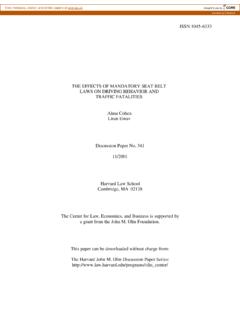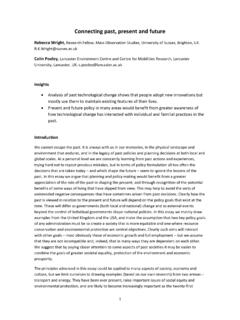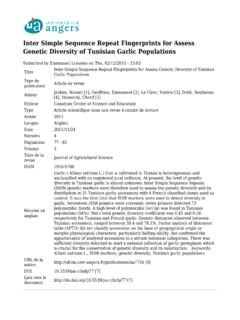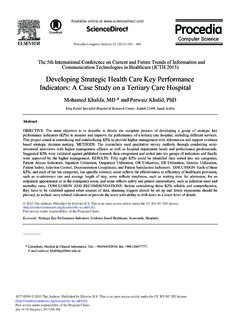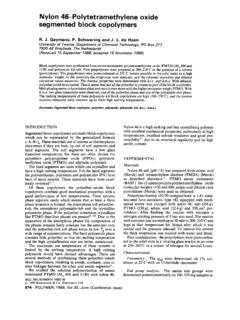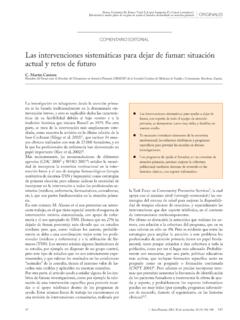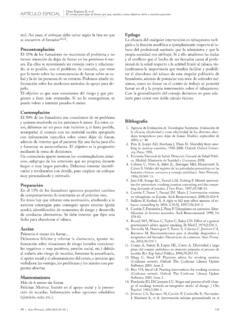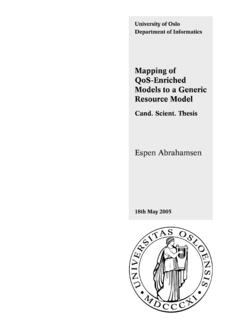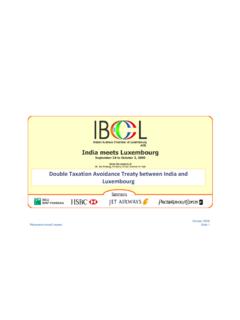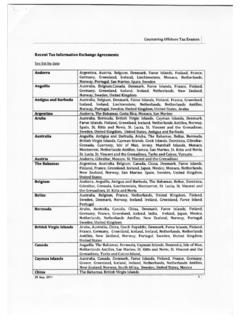Transcription of Sports image rights – countering tax evasion in the ...
1 Sports image rights countering tax evasion in the football industry by Corinna Coors1 I. Introduction In the June issue 2015 of the International Sports Law Journal, I discussed the taxation of Sports image rights in the UK, including the recent update of the Inland Revenue (HRMC) to their capital gains tax manual on the taxation of image The debate over more effective tax regulation for top-earning athletes has recently intensified, following media reports about tax evasion in the football industry and the potential abuse of image rights arrangements to reduce tax According to the 2016/2017 report by the UK Public Accounts Committee, 43 players, including Manchester United s Wayne Rooney, 12 clubs and eight agents are currently the subject of open tax inquiries related to image rights In separate investigations, Cristiano Ronaldo and Jose Mourinho.
2 Have been targeted by Spanish and British tax authorities for allegedly moving more than 100 million in a tax avoidance scheme on the British This article provides an update on the status of recent efforts to reform the taxation of foreign domiciled persons and offshore trusts as at January 2017. The new rules may have implications on tax and image right structures commonly used by foreign wealthy footballers in or moving to the UK. While the proposals are a step in the right direction, it is recommended that existing and forthcoming tax rules must be enforced more effectively to reduce tax evasion in the Sports and entertainment industry to a bearable minimum. 1. Background The economic value of image rights of sport stars has increased tremendously over the last decades. License fees and royalties are a valuable source of income for many Sports personalities and clubs in With USD$32 million from endorsements alone, Cristiano Ronaldo topped the list of the Forbes 2016 ranking of the athletes earning the most from endorsements.
3 Ronaldo holds multiple endorsement deals, including a number of world famous companies, Nike, Coca-Cola and Given the immense value of image rights , footballers and clubs often use complex image rights agreements to limit their overall tax liability. They can benefit from the current tax rules in the UK that allow image rights income to be treated as a separate revenue stream from the income earned from the players professional It means that footballers are liable to pay UK tax on their income resulting from their player s contracts. At the same time they could set up a company to receive payments for their valuable image rights in an offshore tax haven, for example in Jersey or Guernsey in the English Channel, where tax could be paid at a much lower corporate While these schemes are, generally, legal, other activities may be less legitimate and in some cases illegal.
4 For example, in cases where the image of a footballer has no considerable commercial value, the club may still pay large sums to the image rights 1 company. Rather than paying for the commercial use of the image of the footballer, the club would effectively make disguised salary payments to the company to benefit from the lower corporate tax In Sports Club, Evelyn and Jocelyn plc v Inspector of Taxes 200011, Her Majesty s Revenue and Customs (HRMC) had challenged such image rights arrangements entered into by the premiership football club Arsenal and two of its players, Dennis Bergkamp and David Platt. Bergkamp had his own image rights company incorporated in the Dutch Antilles in 1991 and had assigned his image rights to the company. Platt also had an offshore image right company which contracted with another company.
5 Both players signed employment contracts with Arsenal Football Club in 1995. Arsenal signed separate agreements with their image rights companies which provided Arsenal with the right to exploit the player s image rights in return for an agreed fee. This fee was seen by HMRC as earnings arising from the player s employment and therefore taxable. HMRC viewed the image rights arrangements as a smokescreen which had been created in an attempt to disguise salary payments as image rights payments. Bergkamp, Platt and Arsenal appealed against this ruling to the Special Commissioners claiming that the image rights agreements were separate genuine commercial agreements that could be enforced. The Special Commissioners rejected the view of HRMC and held that the arrangements were not a smokescreen.
6 Payments made by Sports Club under the promotional agreement and the consultancy agreement were genuine commercial agreements which had independent and separate value over the employment Since the decision in Sports Club, HMRC has often sought to scrutinise the offshore image rights agreements reached between players and clubs, insisting that these were simply disguised remuneration .13 In 2009 HMRC informed many Premier League Clubs that it was examining image rights payments to players from 2005 to 2008. In 2012 HMRC reached settlements with 15 Premier League clubs in relation to image rights payments. In the same year Chelsea Football Club revealed a payment of in relation to an industry-wide investigation into the taxation of payments under image rights in their public It has been reported that HMRC has since agreed with football clubs that image rights can only make up 20% at most of a player's total In summary, while HMRC has taken action to prevent the abuse of Sports image rights arrangements.
7 The recent report by the UK Public Accounts Committee suggests that not all football clubs are complying with their obligations to disclose their earnings under the settlement HRMC itself has come under fire for allegedly providing special customer relationship managers to wealthy sport stars while the amount of tax paid by this very wealthy group of individuals has actually fallen by 1 billion since the unit was set up in The report urges HRMC to be more transparent about its work and to deliver on its plans to counter aggressive tax avoidance 2. How the UK might be affected by the UK s changes to non-dom tax rules offshore image rights agreements are often used by non-UK domiciled The UK's draft Finance Bill 201720 published in December 2016 brought some 2 changes to the tax rules of individuals not domiciled in the UK (non-doms).
8 Eligibility for non-dom status essentially relies on showing that either the non-dom, their father or grandfather was born outside the The proposed changes will come into effect from 6 April 2017 and will be legislated as part of the 2017 Finance Act. Under current UK tax law, foreign domiciled athletes can be divided into athletes who are resident in the UK (resident non-doms) and those that are just visiting temporarily to compete (visiting non-doms). Resident non-doms are resident in the UK for lengthy periods (for example, foreign players, who play for a Premier League football club, like Arsenal s Mesut zil or Manchester s Zlatan Ibrahimovi ) while visiting non-doms will only visit the UK to participate in certain events, for example the Olympics, the Wimbledon Tennis Championships, or various athletics meetings throughout the The new rules will effectively only affect the first group of athletes, UK resident non-doms.
9 A) Current tax incentives for resident non-doms Most foreign players in the Premier League will typically be resident non-doms for UK tax purposes. They can currently legitimately avoid paying UK taxes by electing to be taxed on the remittance basis .23 Under these rules, the player would be liable to pay tax in full on any income or capital gains earned in the UK; however any non-UK income or gains would not be taxable under UK law unless it was brought ( remitted ) back in the UK. The player can choose whether or not to be taxed on the remittance basis for every new tax year depending on his financial circumstances for that He can enjoy the advantage of the remittance basis of taxation free of charge for the first six years of residency. After this time, there will be an annual remittance basis charge of 30,000 (rising to 60,000 if he has been resident for 12 out of the last 14 years and finally 90,000 if he has been resident for 17 out of the last 20 years).
10 25 In summary, the current non-dom rules are an attractive option for wealthy sport stars moving to the UK. For example, if Arsenal midfielder Mezut zil, who will most likely be considered as resident non-dom for tax purposes, elects to pay an annual remittance charge after six years of residency, he can avoid paying tax on his global income and gains including any profits from endorsement deals outside the UK. b) What is changing? With effect from April 2017 the permanent non-dom status will end. Non-doms will be deemed domiciled once they have been resident in the UK for 15 of the past 20 years (the 15/20 rule). The objective is to create a fairer and competitive tax Once deemed UK domiciled, a foreign player will no longer be able to claim the remittance basis of tax, but will be required to pay UK tax on his personal foreign income and gains in the same way as UK-domiciled tax payers.
